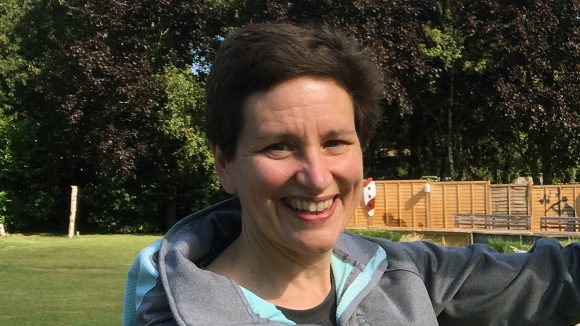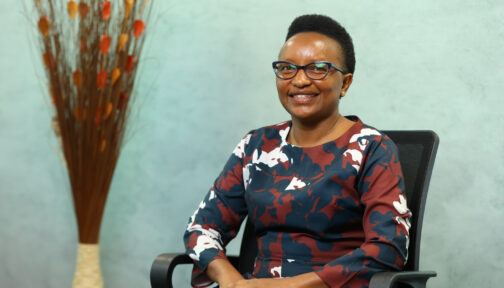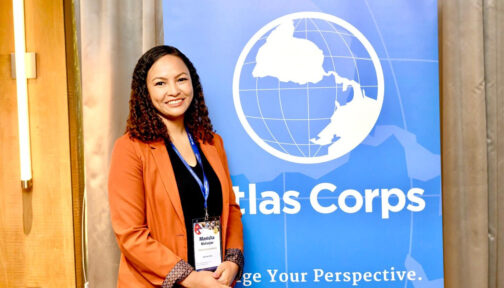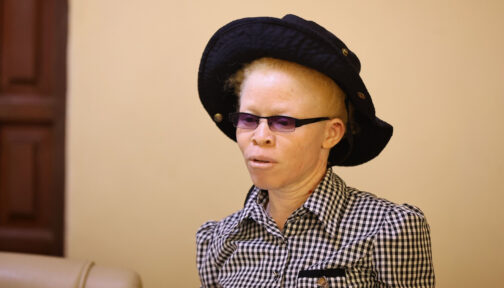Lorraine Wapling is a Senior Disability Expert for the Disability Inclusion Helpdesk, run by Social Development Direct.
As part of the Inclusive Futures initiative, the helpdesk provides research and advice to the UK’s Foreign, Commonwealth and Development Office (FCDO) and other government departments on disability inclusion in policy and programmes.
In 2020, Lorraine spoke to us about what compelled her to focus her career on social inclusion and her hopes for the helpdesk.
Lorraine’s story
“I did the classic thing: I was a VSO volunteer way back when. I cut my teeth in rural communities in Uganda. Over five to six years, I worked directly with communities as a volunteer, and then a staff member in Tanzania. We helped support lots of different organisations working at community level involving women’s groups, small environmental projects and micro-enterprises.
“I think that really sealed it for me in deciding I need to do this, because when you’re working at grassroots level you do become quite aware of social injustices. One of the strongest things I learnt is that people are the same – they have the same desires, aspirations. They’re not different, it’s just that people’s circumstances are really different. As a young person that really got me, and I realised I have a privileged position, so I have the opportunity to try and do something about it. I’m deaf and have a cochlear implant. That’s another privilege – that I have access to this technology.”
Building a career in social justice
“While in Tanzania and Uganda, I hooked up with the deaf community. It was a social thing rather than work, but when I got back to the UK and started working for ADD International, the two things came together and morphed into becoming my job. I continued not just working on disability rights, but also social justice. Now I’m writing up my PhD on how prepared teachers in Kenya are to teach deaf kids who don’t have a language that come into pre-primary and early grades at school.
“I love to think back to a conversation I had with a woman in Northern Uganda to put things in perspective. When I was on a freelance evaluation assignment visiting an economic empowerment programme, I met with the leader of a women’s cooperative and she was quite extraordinary. She showed me her shop and said to me: “I live in the middle of nowhere, and somehow you have come from the UK and you have found me and we are talking.” That was a real moment which has really stayed with me.
“And then the other extreme is that I’ve done some presentations at the United Nations talking about disability inclusion and women with disabilities. I mean, that’s really special, too. I guess, maybe, what I’m most proud of is the fact that I’ve been in both those positions.”
A new disability inclusion resource
“The Disability Inclusion Helpdesk supports FCDO staff with evidence or ideas of what works around disability inclusion as they’re developing or reviewing their programmes. It’s run by Social Development Direct – an Inclusive Futures partner that has experience of managing other helpdesks, like the Violence Against Women and Girls Helpdesk.
“FCDO really wanted this new helpdesk because they made big commitments at, and prior to, the Global Disability Summit. They have disability inclusion standards for all of their offices which they need to meet. I think they’re aware that they don’t necessarily have all of the technical capacity that they need in order to meet these targets, so the helpdesk is an immediate resource.
“FCDO staff pose a question to the helpdesk, which might be something like: “How do we make this project more inclusive for people with disability?”, or “What is the evidence on what works for inclusion of disabled people in agricultural markets?”, or a request for training for staff. It can be really random! We must answer it within a couple of weeks and sometimes we can quickly coordinate a ‘phone-a-friend’ session, where they can have a call with an expert.
“It’s been working extraordinarily well. We tend to get good reviews from FCDO and we’ve been utilised quite a lot, so I think it’s been a very successful part of Inclusive Futures.
“I think what’s also good about it, is working to make sure mainstream projects include a disability inclusion perspective. It’s one of the most interesting things I’ve done in my work in a long time because it’s really challenging but also very satisfying.”
Uncovering the evidence gaps
“One of the things that I really like about the helpdesk, too, is that we’re able to say: “This is what we don’t know.” It’s really a very exciting part of the whole Inclusive Futures initiative. We’ve been asked lots of really good questions, many of which we’ve sadly not been about to provide much evidence for in terms of peer-reviewed evidence. But we’ve certainly always done our best to try and find evidence around good practice or emerging good practice. But they haven’t given us a question we couldn’t answer, yet…
“We’re uncovering lots of gaps, and now suddenly FCDO is aware of these gaps, and that’s really good for researchers to come up with answers to these questions. This is especially important now during the COVID-19 pandemic, because when you go to the literature – to the evidence-base – there are huge gaps; there isn’t advice on how you do home schooling in an inclusive way.”
Inclusion in COVID-19 responses
“When the whole world went into apocalypse mode because of COVID-19, gender and social inclusion considerations just disintegrated. I saw how suddenly it became much more about an emergency-type, humanitarian response. And all of the gender and social inclusion perspectives just seemed not to matter anymore.
“I found myself constantly having to say: So how are you making this inclusive? It’s all very well you saying you’re going to do X, Y and Z, but what about families and carers with responsibilities?
“It’s vital that we continue to keep this gender-, social inclusion- and rights-based perspective on the agenda because it was frightening how quickly it just disappeared. It’s also really important that we are gathering as much evidence as we can on good practice now, because it’s never happened before.
“When disasters happen, people with disabilities are passed by and information on what happened, whether they were included or not included, just isn’t collected.
“We can’t go through that again. We can’t leave this off the agenda again. You can’t be ignoring people with disabilities, because they have to be part of the reconstruction phase. It doesn’t make economic sense to leave them out.
“So, we have to be working to make sure that people with disabilities are contributing, their voices are heard, we know what’s happening to them, and we know where the gaps are. It’s super important right now.
“We have to make sure that disability-inclusive development becomes the norm. It shouldn’t be something that is left to specialists or technical advisers, or whoever; it must become a normal practice. I mean, if we could achieve that, that would be amazing.”



